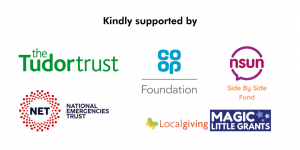Emma shares her story and introduces us to her dad, and all she’s learnt since he died.
My Dad was 59 when he died. He retired in the August, started to feel ill a few months later, and got his diagnosis in April. Pancreatic cancer, inoperable. He had treatment to ease his symptoms, maybe prolong his life a bit, but there was never any prospect of recovery.
He died nine months later, five months short of reaching 60.
The facts are grim – it feels grim writing it, and grim is an understatement for how it felt at the time. Every loss has awful details to it, adding insult to injury, and ours was no exception. Covid restrictions and a terminal diagnosis weren’t a good mixture. My Dad on his deathbed while my sister gave birth was an even worse one. Overall, 0/10 – would not recommend.
There we were – and here we still are – left in the wake of this awful thing. Coming up to two years later, marvelling at where that time has gone, we miss him acutely. I don’t think that will ever stop.
For all I’m about to say, this isn’t an ‘every cloud has a silver lining’ thing. I wish that my sister and I still had our Dad, I wish my Mum had her husband and I wish my sons and nephews had their Grandad. I’m grateful for what grief has taught me, but I wouldn’t wish it on anyone.
So, without further ado, here are the lessons I took from my grief.
Lesson One: Don’t take the simple things for granted
When my Dad first got his diagnosis, he wanted two things: to go out for a pint (thanks, lockdown!) and to get out on his bike. Fast forward a month or so and he had a new goal – to live long enough to meet his youngest grandchild.
He managed all three – the last one being an incredibly close call.
What struck me about that list is that they’re all everyday things. Seeing friends, fresh air and family.
When it comes down to it, it’s not the flashy stuff that matters.
Lesson Two: Live for now
My Dad left school at 15 and worked full time, doing long hours, until the year before he died.
When they were in their late forties, my parents bought a motorhome. They got away whenever they could, around work, and had holidays all over the country. They’d talked about waiting until they retired – thankfully they didn’t.
They were robbed of a retirement spent travelling together, but I know they were so glad they had that decade of getting away in their van.
Tomorrow isn’t guaranteed; don’t put off your dreams.
Lesson Three: Get your priorities straight
As I sat and typed out my Dad’s eulogy, I thought about what we’d remember most about him, and what actually didn’t matter at all.
So much of it centred around him being funny, adventurous, and how much he loved us all.
There wasn’t a single mention of what he earned. There was a section on him eating dozens of pickled eggs for charity.
There wasn’t a single mention of how much he weighed. There was a section about how he accidentally stood my Mum up on their first date.
I didn’t list every job he’d had. I did talk about how loved he made us feel.
If you’re overthinking something, ask yourself if it’s likely to go in your eulogy.
(Also, make sure there’s some funny stories to go in there. People will need a laugh.)
Emma Foley
If you’d like to share your story, submit your blog post to blog@letstalkaboutloss.org


